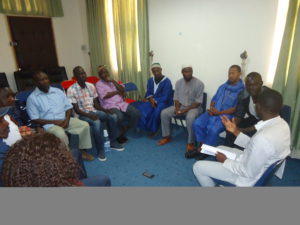19 March 2018
An investigation on the economic profitability of the informal Senegalese restaurants of roasted sheep called dibiteries, revealed that there is a positive effect of the application of hygiene practices on the economic performance of the dibiteries with a positive net benefit.
Dibiteries are strongly imbedded in the Senegalese food habits, while being known for their lack of hygiene. This situation causes foodborne infections for consumers and shortfalls for the dibiterie owners. Building upon the hypothesis that good knowledge about hygiene practices and their practical application by the dibiterie owners would reduce foodborne infections for consumers and increase the profitability of the dibiteries owners, a team of researchers including Malik Orou Seko, a PhD fellow of Afrique One-ASPIRE, carried out an intervention research project. The aim of this investigation was to grasp the correlation between the profitability of dibiterie owners and their good hygiene practices.
A workshop to present the results of this study was held during a workshop on the 14th of March 2018 at the “Ecole Inter-Etats des Sciences et Médécines Vétérinaires” in Dakar, Senegal. It was in presence of 26 dibiterie owners and officers of the Senegalese livestock departmental service and the hygiene regional service.
 It was found that the application of good hygiene practice in dibiteries increases the benefit of dibiterie owners. However, further studies must be done to better grasp the interconnections between economic gain and managerial behaviour regarding food safety and customer satisfaction of dibiteries. This is precisely what Malik is doing in the frame of his PhD research with the full support of Afrique One-ASPIRE. This study will allow the set-up of tools for decision-making and control of the risk factors for microbial contamination of roasted meat, through a cost-effective intervention.
It was found that the application of good hygiene practice in dibiteries increases the benefit of dibiterie owners. However, further studies must be done to better grasp the interconnections between economic gain and managerial behaviour regarding food safety and customer satisfaction of dibiteries. This is precisely what Malik is doing in the frame of his PhD research with the full support of Afrique One-ASPIRE. This study will allow the set-up of tools for decision-making and control of the risk factors for microbial contamination of roasted meat, through a cost-effective intervention.
Share on: